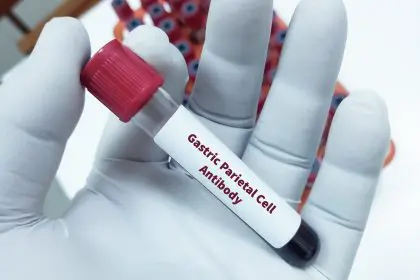Your body relies on a team of essential nutrients to function at its best, but one crucial player often flies under the radar until something goes wrong. Vitamin B12, a water-soluble nutrient, silently powers some of your body’s most vital processes – from creating DNA to keeping your nervous system running smoothly. Yet many Americans remain unaware they’re running dangerously low on this health cornerstone.
The hidden hero in your health arsenal
Vitamin B12, also called cobalamin, works behind the scenes to maintain your body’s most fundamental functions. It helps create red blood cells that carry oxygen throughout your body, supports the production of DNA (your genetic blueprint), and keeps your nervous system functioning properly. What makes B12 particularly tricky is that your body can store it for years, meaning deficiency symptoms may not appear until your reserves are severely depleted.
This extended storage capability explains why many people remain unaware of their declining B12 levels until physical symptoms emerge – often after considerable damage has already occurred. By understanding your body’s B12 needs now, you can prevent potential health issues before they start.
How much B12 do you actually need?
Your required B12 intake varies throughout life, with needs shifting based on age, gender, and life circumstances. For most adults 14 and older, health authorities recommend 2.4 micrograms daily. This amount increases to 2.6 micrograms during pregnancy and 2.8 micrograms while breastfeeding.
Children need progressively more B12 as they grow: infants under 6 months require 0.4 micrograms, babies 7-12 months need 0.5 micrograms, toddlers aged 1-3 years should get 0.9 micrograms, children 4-8 years old need 1.2 micrograms, and those 9-13 years old require 1.8 micrograms daily.
These seemingly tiny amounts highlight just how potent this vitamin truly is – fractions of a microgram can make the difference between optimal health and deficiency.
7 warning signals your body needs more B12
When B12 levels drop too low, your body sends distress signals that shouldn’t be ignored. Watch for these seven telltale signs of deficiency:
- Unusual fatigue and weakness: When your body can’t produce enough red blood cells due to low B12, oxygen delivery becomes compromised, leaving you feeling exhausted despite adequate rest.
- Numbness and tingling in extremities: One of the earliest warning signs often appears as pins-and-needles sensations in your hands and feet, signaling potential nerve damage from insufficient B12.
- Cognitive fog and memory issues: Brain function can decline with inadequate B12, leading to difficulty concentrating, memory lapses, and general mental cloudiness.
- Mouth and tongue discomfort: A surprisingly visible sign of B12 deficiency appears as a swollen, smooth, and unusually red tongue, often accompanied by mouth ulcers or a burning sensation.
- Mood changes and irritability: B12 plays a crucial role in producing brain chemicals that regulate mood, with deficiency potentially triggering depression, irritability, and anxiety.
- Dizziness and balance problems: Insufficient B12 can affect your balance and coordination, leading to dizziness, stumbling, or a general feeling of unsteadiness.
- Pale or jaundiced appearance: With inadequate red blood cell production, your skin may take on a pale yellowish hue, particularly noticeable in those with fair complexions.
In infants and children, B12 deficiency presents additional concerns, potentially causing developmental delays, failure to thrive, or reluctance to eat solid foods. Early intervention is essential to prevent lasting harm to growing bodies and developing brains.
The top B12-rich foods to add to your shopping list
Your diet remains the most natural way to maintain healthy B12 levels. The richest sources come primarily from animal products, with some standout options including:
Beef liver (3 ounces): Packing an impressive 70.7 micrograms per serving, liver provides nearly 30 times your daily B12 requirement.
Clams (3 ounces, cooked): These seafood delights deliver 17 micrograms of B12, easily surpassing your daily needs.
Salmon (3 ounces): Beyond its heart-healthy omega-3 fatty acids, salmon offers 2.6 micrograms of B12 per serving.
Milk (1 cup, 2%): Dairy provides a reliable B12 source with 1.3 micrograms per cup.
Eggs (1 large, cooked): Each egg contains approximately 0.5 micrograms of B12, making them a valuable part of a balanced diet.
Turkey breast (3 ounces, roasted): Lean poultry contributes to your B12 intake with 0.3 micrograms per serving.
For those following plant-based diets, finding adequate B12 requires more planning. Fortified foods like nutritional yeast, plant milks, and certain breakfast cereals can help bridge the gap, though supplements often become necessary for vegans and strict vegetarians.
Who faces the highest risk of B12 deficiency?
Certain groups face elevated risks of developing B12 deficiency regardless of their dietary choices. These vulnerable populations include:
Adults over 50: As we age, our bodies naturally produce less stomach acid, which is essential for B12 absorption from food sources.
Vegetarians and vegans: Without animal products in their diets, these individuals must rely on fortified foods or supplements to meet B12 requirements.
People with digestive conditions: Those with Crohn’s disease, celiac disease, or other disorders affecting nutrient absorption face higher deficiency risks.
Weight loss surgery patients: Bariatric procedures can significantly reduce the body’s ability to extract B12 from food.
Medication users: Long-term use of certain drugs, including proton pump inhibitors, H2 blockers, and metformin, can interfere with B12 absorption.
If you fall into any of these categories, regular monitoring of your B12 status becomes especially important for maintaining optimal health.
Finding the right supplement solution
When diet alone can’t meet your B12 needs, supplements offer an effective alternative. Available in various forms, including pills, sublingual tablets, nasal sprays, and injections, B12 supplements come in two primary varieties:
Methylcobalamin: This natural form of B12 is more easily utilized by your body and often preferred for those with certain genetic variations.
Cyanocobalamin: The synthetic version tends to be more stable and cost-effective, making it the most commonly available form in supplements.
For severe deficiencies, healthcare providers may recommend B12 injections to bypass digestive absorption issues altogether. These shots deliver the vitamin directly into muscle tissue, allowing for immediate availability to cells throughout your body.
While generally considered safe, high-dose B12 supplementation can occasionally cause mild side effects such as headaches, nausea, or skin reactions. More serious adverse effects remain rare but can include allergic reactions or interactions with certain medications.
The road to recovery from B12 deficiency
Restoring healthy B12 levels takes time, with improvement timelines varying based on deficiency severity and individual factors. Most people notice increased energy and reduced symptoms within weeks of beginning treatment, though complete recovery of nerve function may require months or even years.
The most effective approach combines appropriate supplementation with dietary changes to ensure sustained B12 sufficiency. Regular monitoring through blood tests helps track your progress and adjust treatment as needed.
For optimal results, work with healthcare professionals to develop a personalized plan addressing your specific needs and circumstances. This collaborative approach ensures you receive the right form and amount of B12 while addressing any underlying conditions contributing to your deficiency.
By taking proactive steps to maintain healthy B12 levels, you invest in your body’s fundamental processes and protect yourself from the potentially serious consequences of deficiency. This small nutrient makes an outsized contribution to your overall health and well-being, deserving far more attention than it typically receives.













